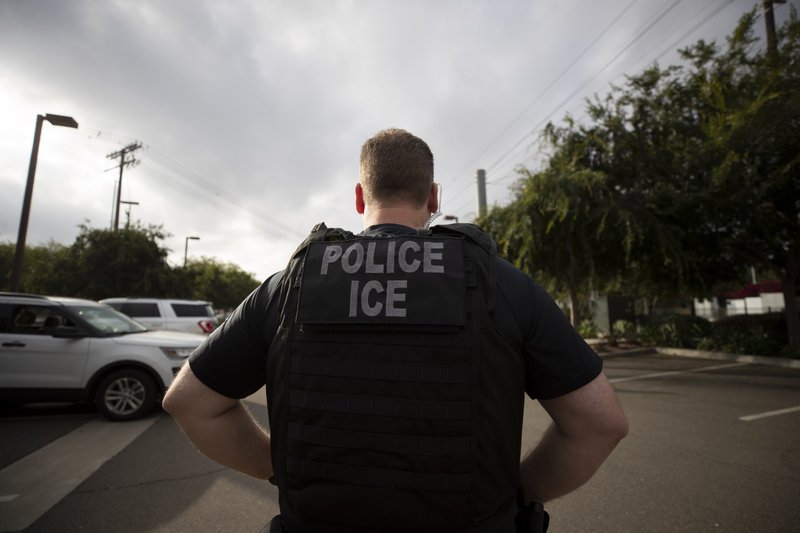DETROIT -- Migrant advocacy groups and hotel employee unions are pressuring Marriott, MGM and other hotel chains not to house migrants who have been arrested by Immigration and Customs Enforcement officers.
"Hotels are meant to welcome people from all over the world, not jail them," said D. Taylor, president of the hotel workers union Unite Here.
For decades, the U.S. government has occasionally detained migrants in hotels. Matthew Albence, the acting director of Immigration and Customs Enforcement, has said the agency might have to split up families if hotels don't help.
Hotels are used to working with the government, often hosting flood victims, defense contractors or conferences.
But when President Donald Trump's administration announced Immigration and Customs Enforcement arrests targeting families the weekend of July 13 and said it might use hotels, the big companies responded. Marriott, Hilton, Choice Hotels, Best Western, Wyndham, Hyatt, IHG and MGM Resorts all released statements saying they don't want their hotels used to detain migrants.
Hotels have felt pressure from their unions -- which represent thousands of immigrants -- as well as from customers angered by recent scenes of crowding and other inadequate conditions at detention facilities.
The companies also needed to reassure customers that their properties are safe and not overrun by armed guards watching migrants, said Daniel Mount, an associate professor of hospitality management at Pennsylvania State University.
So far, there's been little evidence of widespread arrests.
But the hotels' stance has frustrated Albence. He said Immigration and Customs Enforcement uses hotels "strategically" to keep families together before transferring them to detention centers or deporting them. As of Tuesday, the agency had 53,459 people in custody.
"If hotels or other places do not want to allow us to utilize that, they're almost forcing us into a situation where we're going to have to take one of the parents and put them in custody and separate them from the rest of their families," Albence said in a recent interview.
The Trump administration's zero-tolerance policy last year led to the separation of families at the southern border, causing an outcry before it was abandoned.
One national chain, Motel 6, faced lawsuits after it was accused of sharing guests' names with immigration authorities.
Immigration and Customs Enforcement wouldn't say whether it's now using hotels to detain migrants.
Despite the corporate positions, individual hotels might still work with the enforcement agency. Franchisees run 88% of hotels in the U.S., according to hospitality data firm STR, formerly known as Smith Travel Research. Franchise agreements don't expressly prohibit the housing of detained migrants.
Hotel companies could change those agreements to ban the practice, but waiting for the deals to expire and rolling out new ones would take years, Mount said. And not all hotel owners would back the change.
Walter Barela, who runs 10 hotels across the Southwest as principal of Albuquerque, N.M.-based Peak Hospitality, said some of his hotels on the border work with church groups to house newly arrived migrants at discount rates. But he has never been approached by U.S. officials about rooms for detained migrants.
He said that if he was, he would consider it. Barela, who serves on the board of the national Latino Hotel Association, said hotels close to Mexico "live and breathe off the Border Patrol." He said he once sold a hotel because occupancy dropped sharply after border officers were reassigned.
"It's not our business to stand on one side of the debate or another," Barela said. "We have to make people across a wide spectrum feel comfortable in our establishments."
Contracts with the government can be lucrative. According to federal contract listings, Quality Suites San Diego Otay Mesa, near the Mexican border, could earn $502,900 between 2016 and 2020 for housing migrants for Immigration and Customs Enforcement.
Mount said the government generally pays a higher rate than a budget hotel ordinarily could command.
"If the government is saying, 'We can fill half the hotel at $99 per night for six months or a year,' that's hard business to turn away from," he said.
Available data suggest the government detains migrants at hotels on a limited basis. On a November 2017 list of government detention facilities, just 12 of the 1,685 sites were hotels. The list, obtained by the Immigrant Legal Resource Center, also includes county jails and hospitals.
Only one of those hotels -- the Quality Suites San Diego Otay Mesa -- had housed more than three migrants. It had as many as 120 detained migrants at one time in fall 2017.
In a September 2017 customer review on the Quality Suite's website, a guest wrote, "The hotel booked two floors for detainees and held them there with guards in the hallways all night and noisy too. And they put our group just doors away on the same floor."
In 2016, another guest reported that rooms were being guarded by border security. Washcloths were stuffed in the doors to prevent them from being closed, the review said.
Choice Hotels, which owns the Quality Suites brand, said the hotel signed a contract with the Department of Homeland Security in 2016 but that the hotel doesn't plan to renew it. The department oversees Immigration and Customs Enforcement.
Choice Hotels said no migrants are currently being detained at the hotel. The hotel's general manager didn't respond to several requests for comment from The Associated Press.
John Sandweg, a former acting director of Immigration and Customs Enforcement, said migrants detained in hotels are usually kept there less than a week while their deportation papers or other orders are processed. They are generally confined to their rooms and are guarded. Meals are provided.
"People will be upset about this, but in the end, it's probably cheaper than detention," he said.
Information for this article was contributed by Adriana Gomez Licon, Colleen Long and Elliot Spagat of The Associated Press.
A Section on 07/22/2019
